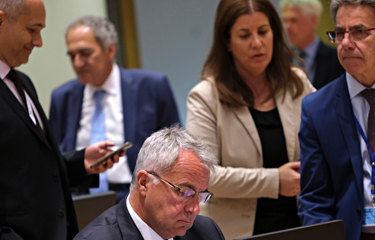The first-ever fishing proposal put forward by the European Commission for the Mediterranean Sea is expected to be adopted by the Agriculture and Fisheries Council (AGRIFISH) at its annual meeting to set fishing opportunities, taking place in Brussels on 16 and 17 December.
Its proposal implements the E.U. multiannual management plan for demersal stocks in the western Mediterranean, adopted in June this year, with a 10 percent reduction in fishing effort. It also introduces measures adopted by the General Fisheries Commission for the Mediterranean, including a fishing effort reduction for demersal stocks and catch limits for small pelagic species in the Adriatic Sea, and a closure period for eel.
Meanwhile, for the Black Sea, there are proposed quotas for the two most important commercial species, sprat (11,475 metric tons – MT) and turbot (150 MT), shared between Bulgaria and Romania.
In a media statement, the Commission acknowledged that 2020 is “a crucial year” for European fisheries, as it is the year when all scientifically-assessed stocks should be fished in line with the maximum sustainable yield (MSY) principle.
As the size of some key fish stocks has been increasing – for instance, haddock in the Celtic Sea and sole in the Bristol Channel – so has the profitability of the fishing sector, with an estimated EUR 1.3 billion (USD 1.4 billion) net profit for 2019. Consequently, the E.C. said that it has proposed total allowable catches (TACs) to keep the fish stocks healthy, while allowing the industry to profit from fishing sustainably.
For the E.U.’s Atlantic and the North Sea stocks, 91 percent of the TACs proposed are in line with MSY, while for the rest, the Commission is proposing even stricter conservation measures to be taken up by member states.
This is the case for herring in the Celtic Sea, where the proposal is to set a TAC of 869 MT (for scientific purposes only), 81 percent less than in 2019. The same goes for cod stocks in the west of Scotland, cod in the Celtic Sea, and whiting in the Irish Sea, where International Council for the Exploration of the Sea (ICES) scientists have given a zero or very low catch advice, and the Commission proposes to stop targeting these stocks.
For Northern seabass, the Commission wants to capitalize on the efforts undertaken since the emergency measures adopted in 2015 and the sustainable management, which led to fishing being in line with MSY levels in 2018. It proposes to fish in the lower range of MSY (1,634 MT) and maintain the closure period during spawning season.
The Commission said that its proposals were both “ambitious and fair,” balancing environmental, economic, and social elements.
“We have lived up to our part of responsibility. It is time for the member states to do the same so that adequate catch limits can enter into force on 1 January, 2020,” it said in a statement.
However, Killybegs Fishermen’s Organisation CEO Seán O’Donoghue has warned that the Commission’s 2020 proposals for cod and whiting in the Celtic Sea are “unworkable,” and would have “dire impacts” on a whole range of fisheries in the area if adopted in their present form.
“Fishermen cannot countenance these unworkable measures in the Celtic Sea that would lead to early closures of a vast array of sustainable fisheries in the area with the loss of jobs as well as putting the viability of the demersal fleet in jeopardy,” O’Donoghue said.
He also highlighted that the Commission’s proposals also contain some “significant reductions” in a number of key Irish stocks such as 15 percent in nephrops, 30 percent in monkfish, and 40 percent in pollock.
“I question the justification for these reductions both on a scientific basis particularly for monkfish and pollock, and also most importantly that the Commission’s proposals take no account of the socio-economic obligations enshrined in the CFP (E.U. Common Fisheries Policy),” O’Donoghue said. “The proposals only take account of the sustainability principles. If the socio-economic obligations had been taken into account, the proposed cuts in some of our key stocks would almost be eliminated or significantly reduced.”
Photo courtesy of Alexandros Michailidis/Shutterstock







